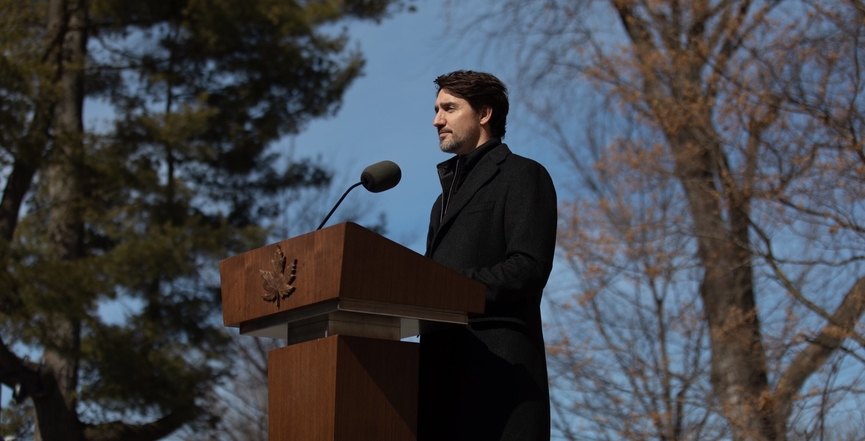A pandemic is a contagious disease that spreads widely around the world, much like bad ideas about how to run a country.
Often undertaken in stealth, governments in Canada and other “advanced” countries have been intent for decades on reducing the size and reach of democratic institutions.
Governments have successfully downsized themselves. As a result, amid the COVID-19 pandemic, leaders are short on the resources necessary to defend public health.
A powerful essay by Taylor Scollon in the online publication Passage demonstrates conclusively the overwhelming deficiencies of the Canadian welfare state.
In the last 20 years, the number of Canadian hospital beds per citizen has declined by 32 per cent. Scollon estimates that currently less than 8,000 Canadian beds are available to welcome new patients, including new, seriously ill COVID-19 patients.
COVID-19 reveals a Canada divided between the exposed and the protected. Exposed are workers laid off from hourly work in the travel and hospitality sectors, gig employees with no ability to work from home, retirees with inadequate pension income, single parents without child care help as schools close and students who need part-time work to pursue studies.
Fully 58 per cent of Canadians have no paid sick leave. Only one in four of workers earning less than $15 an hour qualifies for employment insurance.
An overwhelming number of millennials and low-income Canadians are exposed with no fallback when shutdowns cost them their jobs, incomes, and ability to pay rent and eat.
Protected are those with paid sick leave, defined benefit pensions, professional level incomes and substantial savings income.
Justin Trudeau bravely stated that no Canadians should go without because of the crisis. Good. As prime minister he should commit to relieving the despair of fellow citizens faced with destitution.
In a global health emergency, Canada should be promoting global solidarity. With Donald J. Trump as the current president of the G7, expecting anything positive from that quarter would seem far fetched.
Indeed, a major weakening of social solidarity can be traced back to the 1979 G7 Venice summit, when inflation reduction replaced employment creation as the main priority of the world’s largest economies.
By the time of the Jean Chrétien, Paul Martin 1995 Liberal budget, austerity had became a political obsession. The carefully negotiated agreements transferring cash from the federal government to the provinces were torn up on budget night, and replaced with restricted federal funding for health, welfare and post-secondary education.
The Liberal tax cuts five years later — that proved the whole austerity package was unnecessary — favoured private income at the expense of public welfare.
Reducing the size, scope and effectiveness of government was the big idea, however bad, behind the cycle of spending reductions followed by later tax cuts.
Austerity animated the 2005-2010 Harper Conservative years, interrupted to acknowledge the Great Financial Crisis of 2008 with a stimulus package that included back-up money for the banking system.
The other main preoccupation of Western governments has been promoting the accumulation of net assets (assets less debt) by fortunate individuals protected from the hand-to-mouth existence and falling standard of living of their compatriots.
In the neo-liberal ideology, the world is envisaged from the point of view of the corporate and individual “investor.”
By definition, corporate and personal income tax cuts are good because they free up funds for investment. In reality, the money just goes into the pockets of the wealthy, or accumulates on corporate balance sheets.
In 2012, Bank of Canada chief Mark Carney called the nearly $600 billion in accumulated corporate cash at that time “dead money.”
Contrary to the intentions of its founders which envisaged a central bank at the service of overall economic wellbeing, the Bank of Canada currently has only one official mandate: maintain low inflation.
This objective translates into ensuring that the value of financial institution loan portfolios are protected, not eaten up because inflation rates exceed interest rates on outstanding loans.
With inflation no longer a pressing concern — because of corporate outsourcing of manufacturing to low-wage Asia — central banks have been doing their best to prop up markets for stocks and bonds by keeping lending rates low.
Central banks have been a main vehicle for promoting financial wealth. Recent years of interest rate reductions have inflated stock prices, setting up the present scenario where a pandemic has erased about 30 per cent of investor gains in major markets.
A new era of governments spending to promote employment and public wellbeing would be most welcome.
New policies are desperately needed to address the class divide between the protected citizens and the exposed, as revealed so starkly by the unequal impact of the COVID-19 pandemic.
Duncan Cameron is president emeritus of rabble.ca and writes a weekly column on politics and current affairs.
Image: Justin Trudeau/Twitter




